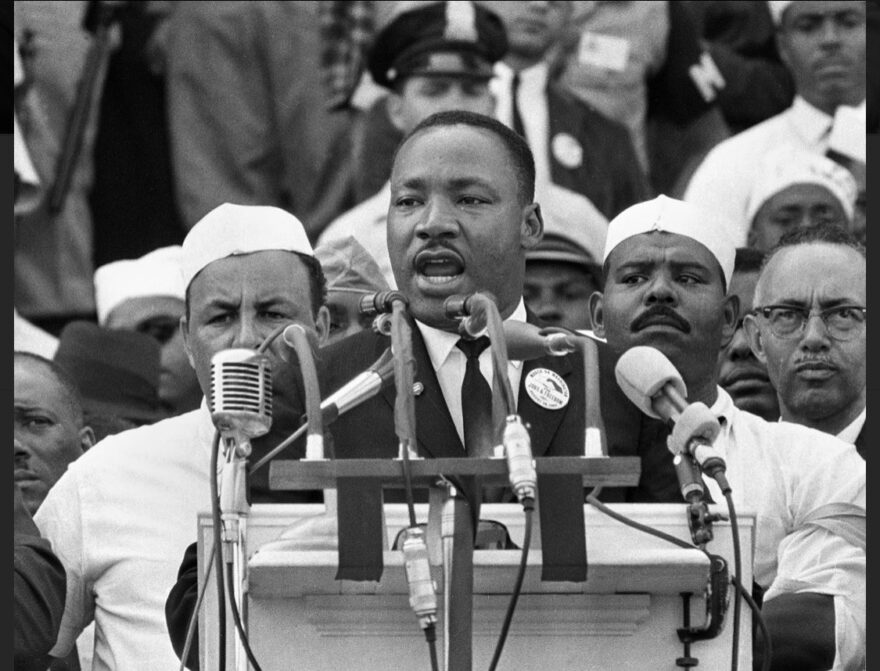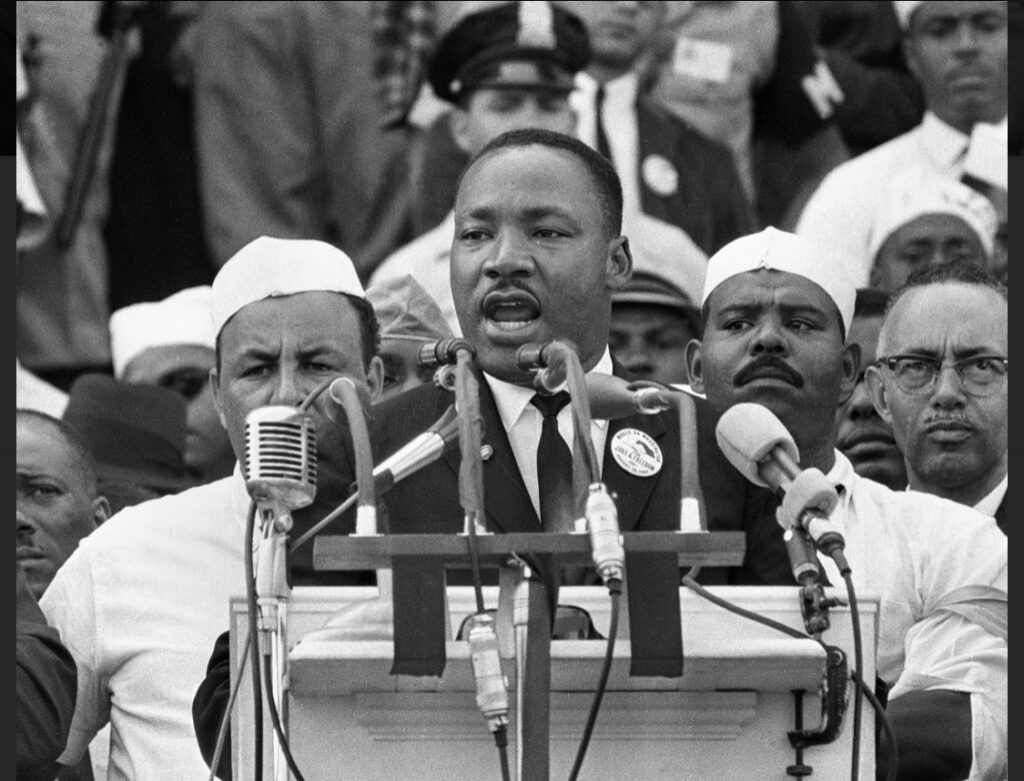
The biblical elements of King’s speech are the often the least discussed and yet most important elements, and that’s a travesty!
Martin Luther King, Jr. stood in front of a crowd of nearly a quarter million civil rights activist who had suffered. They were broken down. They were beaten—emotionally and even physically, and King spends the entire first part of his speech acknowledging these sufferings. He even compares it to a cashed check which has come back marked “insufficient funds,” but it’s not these words that make this moment biblical. It’s those words paired with that group of people, as King himself sat at the feet of the Lincoln Monument itself, in submission to the Fathers of this Nation—-and it was THAT moment that was biblical.
THE FOLLY OF MY YOUTH (Psalm 25:7)
I grew up on the outskirts of Atlanta for most of my childhood. It’s been my own fascinating paradox to explore the ignorance’s of my youth and pair it with my newfound understanding as an adult. As the Apostle Paul said, “When I was a child, I spake as a child, I understood as a child, I thought as a child: but when I became a man, I put away childish things.” ( 1 Corinthians 13:11) That’s kinda how I feel.
BLACK HISTORY CURRICULUMS
In the school curriculums in the South, we celebrated black history month each year, and as a course of study in our education each year, the schools in Georgia would actually spend a great deal of time studying the historical greats of the the Civil Rights Movement. Just to be genuine, THAT course of study had the same impact as my religious “seminary” course studies I took in high school had on me at the time—-which was nada. I got little “wisdom” out of it, not because something wasn’t there, but rather because I wasn’t there yet. There is something that adulthood paired with life experiences brings to these subjects of study that knowledge from books just won’t give you. I’m a different person today, and it’s that soul searching after having painful life experiences that has given me greater perspective.
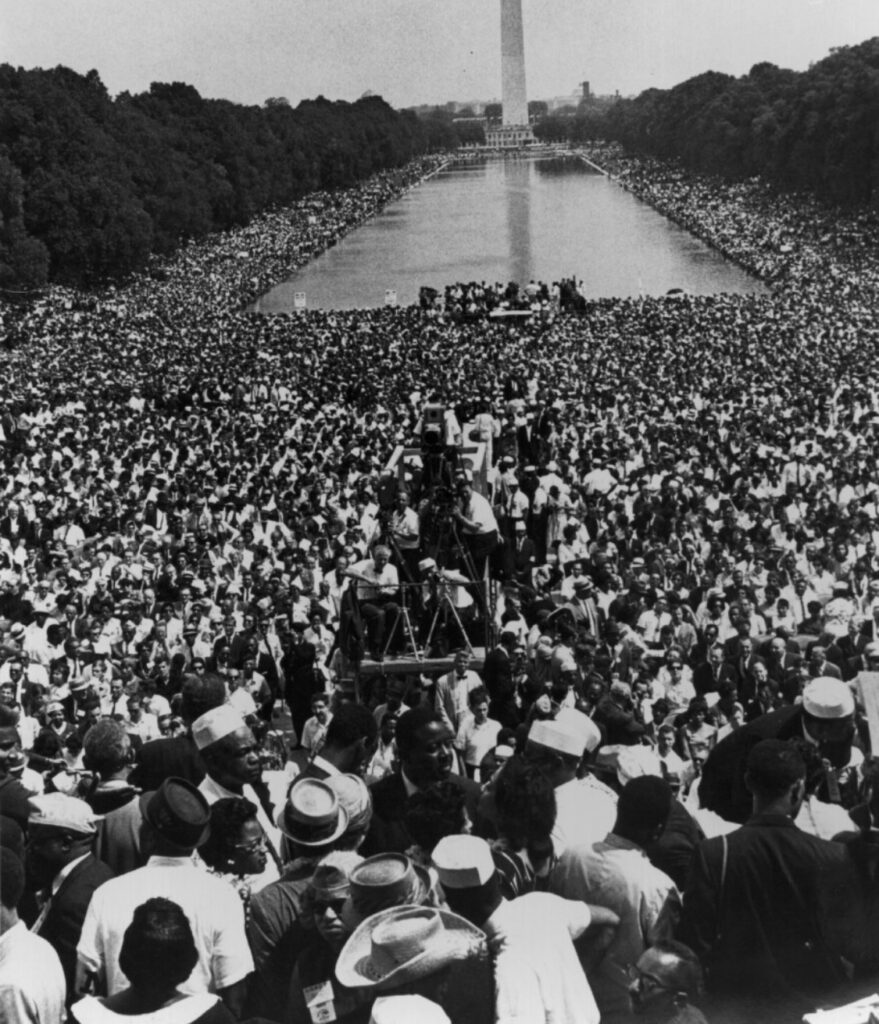
MARTIN LUTHER KING JR.’S SPEECH
On the steps of the Lincoln Memorial, at the 100 year mark of the Emancipation Proclamation, King stood in front of a crowd of 250,000 people giving a speech that he had given multiple times before (Source), in multiple different settings, in front of many other civil rights groups, but this moment was different. He wasn’t just standing in front of the largest audience he had ever spoken to, he was also standing in front of the “Fathers of our nation” and their “Fathers”, and the entire world. (Genesis 17:3-8) (Galatians 3:29) ( The Covenant of the Father’s of this Nation)
A FELLOWSHIP FOUND IN SUFFERINGS (Philippians 3:10)
The biblical elements of King’s speech are the often the least discussed and yet most important elements, and that’s a travesty! Because it is these elements that reveal King’s own personal soul searching and sufferings. You see, Christianity is about sufferings, not because you seek them out, but because, as a suffering servant (Isaiah 53), you are left trying to process why a god that supposedly loves you, would allow such injustices and such misery on any human soul—and this is the moment we will explore King’s speech…
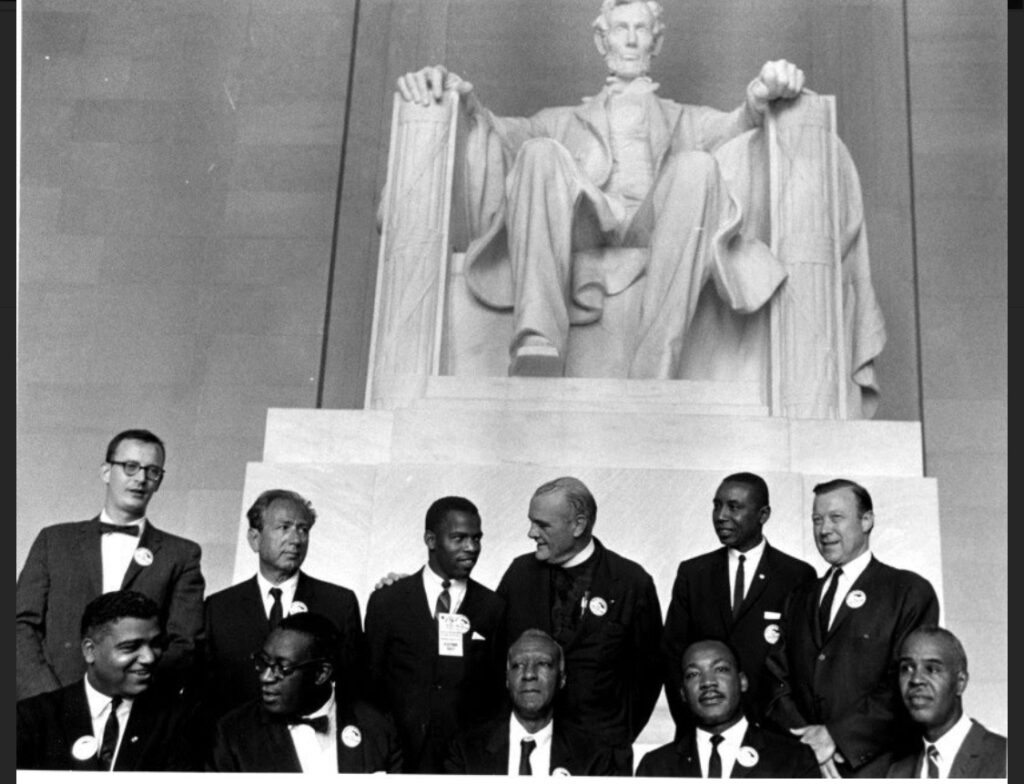
I WITNESSED IT
The first portions of King’s speech begin with a pairing of historical knowledge of the Emancipation Proclamation and the language “Fore Score and 5 years ago.” King is using Lincoln’s own word patterns found in the Ghettysburg address, a speech where Lincoln declared, “that all men are created equal” to make his point. It was a promise, a contract (see Biblical definition of testament), in writing from Lincoln himself to the heirs of this Nation. You see, in my mind I “see” a prophetic moment occurring during King’s speech— one paired with only the imagery that God could create.
THE IMAGE OF ONE KING KNEELING BEFORE ANOTHER
King stood in front of a crowd of nearly a quarter million civil rights activist who had suffered. They were broken down, they were beaten, emotionally and even physically, and King spends the entire first part of his speech acknowledging these sufferings. He even compares it to a check which has come back marked “insufficient funds.” BUT it’s not these words that make this moment biblical. It’s those words paired with that group of people, as King himself sat at the feet of the Lincoln Monument quoting Lincoln himself, in submission to the Fathers of this nation—-and it was THAT moment that was biblical. (Biblical Act of Kneeling to Kings). (The Biblical Greeting Of Kings) You see, in my mind, I saw the Hebrews themselves witnessing THAT covenant of Moses taking place (Exodus 3:5). King himself, during his speech, said he was standing on “hallowed ground” (Moses’s Covenant On Holy Ground) And I agree, only God could have created the imagery of that moment so perfectly.
THE EVERLASTING PATTERN
There is a greater pattern contained in scripture that very few people reach a place they can actually understand it, not because they can’t be taught it, but because THEY haven’t searched their own soul to experience it. This greater pattern is an everlasting pattern (The Pattern). It is a pattern of a people taken into bondage, bound by the chains of oppression (and every generation will experience this in some form or another). But these people experiencing the “chains”of slavery and suffering are paired with a promise directly from God to possess the land of their enemies and prosper— and they will possess the land if they keep that covenant.
THE FURNACE WAS LIT, THE FLAMES WERE HOT
In that summer heat of 1963, King gave his speech on a boiling hot August day. King refers to this moment, (and I’m confident he was referring to the souls of his own people), to the “sweltering summer of the Negro’s legitimate discontent,” and King says it “will not pass until there is an invigorating autumn of freedom and equality.” For me, I can feel that heat, in that moment. Can you? It’s like the very flames of hell are calling out to consume them, and maybe, this time they will just submit, because who could possibly endure it any longer?
I WAS BLIND BUT NOW I SEE
BUT, don’t you see it? This is the same exact moment in scripture when the Israelites make this covenant with Moses before God, and HE says to Israel if THEY WILL KEEP THAT COVENANT, “then I will send rain on your land” in that sweltering summer, “in its season, both autumn and spring rains,” in all seasons, because HE KEEPS HIS PROMISES WHEN NO ONE ELSE WILL,” so that you may gather in your grain, new wine and olive oil.” (The Promise).
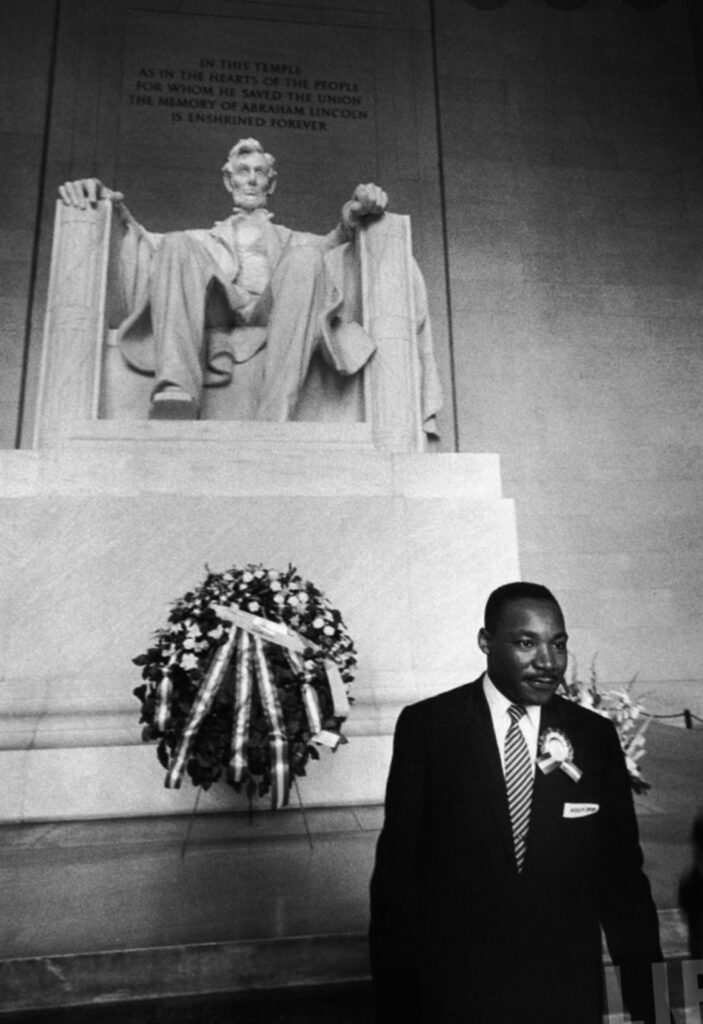
IT’S NOT THE MAN THAT’S HOLY, IT’S THAT HALLOWED MOMENT IN WHICH HE STANDS
These moments are divinely organized, not by men, but by God. You see the Father’s of this nation had also made a covenant sealed with their own blood. A covenant for our own nation—-a covenant of prosperity and liberty. King knew who those fathers were. He could use the language of Lincoln, as if, he was Lincoln himself. How did King know how to wield that sword? (Matthew 10:34-36). Well, King had studied the same Bible they had. He knew it, and they knew it, and it wasn’t the color of their skin that made them brothers at that point—it was The Fellowship of Their Sufferings (Phillipians 3:10)
THE WAY It Has Always Been Done
How did ancient, oppressed peoples possess the lands of their enemies? How did they enter into that prosperity? Well, King already knew The Way, and on that day, IN THAT MOMENT, on that sacred ground, he was teaching his people The Way. King was teaching this broken-down, oppressed, down-hearted , down-trodden people how to enter into this fellowship. He was calling on The Fathers, as all the ancient fathers had done before him to “see” his people—to “see” them as King saw them, as a people who sought land of their own, a land of inheritance, but had not yet obtained it. The time had now come to call on God, and God is the one who decides when that moment is, and it becomes a “memorial” to the people. (Biblical Concept of a memorial).
FEELING RAGE, WHILE NOT EVER LIFTING HIS VOICE
After King symbolically “kneels” at the feet of the “Fathers of this nation” as an act of submission to their kingdom, a kingdom in which Lincoln had promised them a part of in the Emancipation Proclamation—-King, as a minister, was also kneeling in submission before God because that promise by the Fathers of this nation had not yet been kept. Signs follow the believers, and the symbolism of King doing this in 1963 on the 100 year marker of The Emancipation Proclamation was a sign directly from God as far as I am concerned. (The Biblical Greeting Of Kings).
King then proceeds, in his speech, to describe the sufferings of his people. He actually uses the word “exiled.” (Deuteronomy 30:4-6). He outlines repeated injustices, that no father, no mother, no human being can be asked by anyone, especially God, to “thrive” in. The very injustices that kill the “soul” (Matthew 10:28), and the crowd gets fired up. King, in describing these atrocities to the “negro” community, strikes a chord in the crowd. They are angry, and he is angry, and what feeling human wouldn’t be? Despite his calm demeanor in his speech, because he never elevates his voice, this is the very moment that you can feel KING and the crowd’s rage. I’m confident, King’s words also struck a chord in “the hearts of the Fathers,” as they were the same words they spoke themselves, at a different time, and at a different place in history. (Malachi 4:6)
THE CROWD BEGINS TO LAUGH, THEY MOCK HIS WORDS
It’s as if King is taking the crowd through the emotions he had already felt in his own soul, BUT THEN, without warning King turns in an opposite direction (building a Bridge To Cross Over). In fact, the crowd so stunned by this “turn” in the language of King’s speech, the crowd initially thinks he is using sarcasm. You can actually hear people in the crowd laugh, as if, metaphorically they were saying, “YEAH, RIGHT.” (Audio at 4 minutes and 40 seconds) —BUT KING IS NOT saying the same thing they are thinking, and it’s in this moment of magnificence that he turns their hearts. ((Malachi 4:6) It’s at this exact moment that King speaks the words of THE ONE TRUE KING, his teacher (Matthew 20:22) (Bitter Cup) (Cup of Cursings).
You see, King had already been through the rage. He had already walked that same path internally. How else could he speak of it so eloquently?—and guess what he discovered? He discovered the same thing that all of us do who have ventured through this “fellowship of sufferings”—it’s a dead end from which the dead will not rise (1 Corinthians 15:29).
DRINKING FROM THE BITTER CUP, OR WALKING IN THE WAY
There are two paths, and King describes both of them, but he lays out “THE WAY” for the path he personally chose to take—and I will tell you it’s “mentally” narrow and on each side are raging tempests (Exodus 14:21-22) (Joshua 4:23) (2 Kings 2:8)(A Place to Cross Over). The exact line in King’s speech when he begins to “lay” this symbolic path is this…
“And that is something that I must say to my people who stand on the worn threshold which leads into the palace of justice. In the process of gaining our rightful place we must not be guilty of wrongful deeds. Let us not seek to satisfy our thirst for freedom by drinking from the cup of bitterness and hatred.” (I Have A Dream Speech).
SLAYED BY THE SWORD
This whole phrase just slays me. King says MY people, standing on a “worn threshold,” and clearly, it was a threshold that King saw was about to break–and that very threshold was meant to lead to a palace of justice, a palace that was in vision, just not yet in reach. I can only “hear” King saying in his heart, “we’re almost there.” And King’s reference to a “rightful place” IS biblical (Jeremiah 30:18). It’s the “rightful place” at the table of brotherhood for which every servant hopes to be found “watching” (Luke 12:35-59).
LEARNING TO SPIT
It’s that seat at that table with Christ and HIS BROTHERS—who all sit as equals that every down-trodden Saint is suffering for. Oh, but whoa, that “cup of bitterness,” can you drink it? Because King already had! And he ALSO did exactly what MY KING and HIS KING did, he chose to spit it out (Vinegar and Gall). It was a cup of cursing. WILL YOU DRINK IT? And if you drink it, will you also spit it out? It’s the the most bitter, vile drink for the soul. (Matthew 20:22) (The Bitter Cup Jesus Drank).(Ordeal of Bitter Waters) (I’m Coming Out).
HE CLEARS THE WAY—AND UNIFIES US ALL
King’s Speech from this point forward, “clears” The Way (Acts 9:2). King says everything I already know. He says everything, they, that came before us, already knew (The Father’s of the Covenant). We could use violence. We could use anger, because WE already have it. It’s the RAGE buried within our own soul that we have already “walked through,” but it’s a bitter cup that leads straight down a path of destruction to the “death of the soul.” And so instead, instead we turn, and we call for suffering, because if we can endure all this suffering, what then are we made of?
NOT BECAUSE WE ARE WEAK, BUT BECAUSE WE ARE STRONG
We are “called” to this suffering, not because we are weak, but because we are strong. (Matthew 22:14). We endure, not because there is no end, but because there is a purpose. We are stronger than those that keep us in bondage, and even stronger than those who can’t control the rage that we have already passed through—not because it doesn’t exist, but because THAT demon no longer controls us. We, as sufferers, are then unified in a “fellowship of sufferings,” because if we can overcome this, and still love, how deep will the rivers of that love be! And yet, it’s not a fellowship in which we are EVER satisfied with injustices, because WE CANNOT BE SATISFIED…. BECAUSE…
TEXT FROM KING’s SPEECH 1963
“for many of our white brothers, as evidenced by their presence here today, have come to realize that their destiny is tied up with our destiny….they have come to realize that their freedom is extricably bound to our freedom. We cannot walk alone.
And as we walk we must make the pledge that we shall always march ahead. We cannot turn back. There are those who are asking the devotees of civil rights, “When will you be satisfied?” WE CAN NEVER BE SATISFIED as long as the Negro is the victim of unspeakable horrors of police brutality.
WE CAN NEVER be satisfied as long as our bodies, heavy with the fatigue of travel, cannot gain lodging in the motels of the highways and the hotels of the cities.
WE CANNOT BE satisfied as long as the Negro’s basic mobility is from a smaller ghetto to a larger one. We can never be satisfied as long as our children are stripped of their adulthood and robbed of their dignity by signs stating “For Whites Only.”
WE CANNOT BE satisfied as long as the Negro in Mississipi cannot vote and the NEGRO in New York believes he has nothing for which to vote.
NO, no WE ARE NOT SATISFIED, and we will not be satisfied until justice rolls down like the waters and righteousness like a mighty stream.
MY FAVORITE LINE IN THE ENTIRE SPEECH
You know, when King gives this speech, the crowd is cheering so loud at his previous statements (the text above) that this line is almost muffled out, but I feel it is his most powerful phrase in nearly the entire speech. It was at this line, when I read it, and heard it, that my soul cried, “AMEN!”
King’s Most Powerful Statement:
“Continue to work with the faith that unearned suffering is redemptive.”
UNEARNED SUFFERING
That’s right. It was “UNEARNED.” YOU NEVER DESERVED IT. You’re children never deserved it. It was unwarranted, unmerited, UNEARNED. It wasn’t your fault—and this my friends, THIS, is the christian walk. It’s the faith in that suffering that was unearned that guarantees a people salvation—a better resurrection (Hebrews Chapter 11). And it is that resurrection that guarantees this fellowship a seat at THAT table with THE ONE TRUE KING— and King knew it. He preached it. He lived it in his own actions leading the Civil Rights movement. He saw the same promises for his people afar off, and those people WERE HIS. (The Call, Romans Ch. 9). (Hebrews 11:13).
DON’T WE ALL HAVE A DREAM
From this point forward in King’s speech, he uses the phrase, “I have a dream,” almost on repeat like a broken record. I have a dream, I have a dream, I have a dream! We all have dreams don’t we? It’s the same dream, that I, as woman have, to sit at THAT table with MY BROTHERS, and eat with them as an equal. (Mark 7:24-28). (Galatians 3:28) (1 Corinthians Chapter 9).
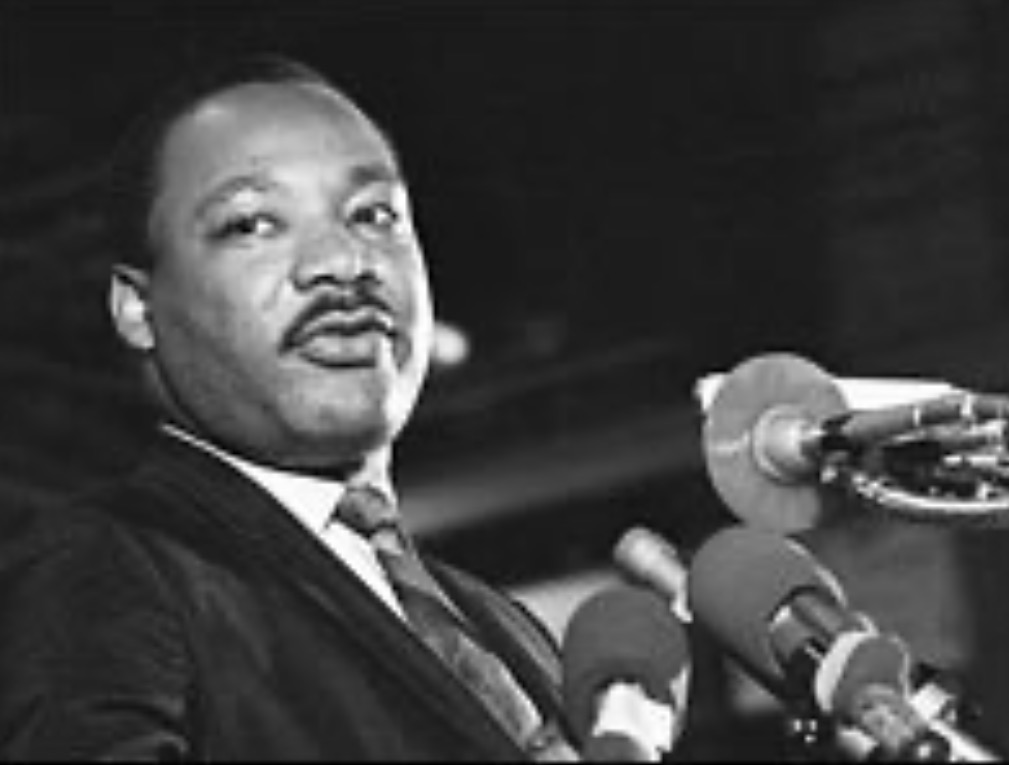
KING FORESAW HIS DEATH
King already knew he was going to die. He foresaw that moment. The day before his assassination he spoke these words in his famous “I’ve Been to the Mountain Top” speech,
“We’ve got some difficult days ahead. But it really doesn’t matter with me now, because I’ve been to the mountaintop. And I don’t mind. Like anybody, I would like to live – a long life; longevity has its place. But I’m not concerned about that now. I just want to do God’s will. And He’s allowed me to go up to the mountain. And I’ve looked over. And I’ve seen the Promised Land. I may not get there with you. But I want you to know tonight, that we, as a people, will get to the Promised Land. So I’m happy, tonight. I’m not worried about anything. I’m not fearing any man. Mine eyes have seen the glory of the coming of the Lord” (King’s Final Speech, I’ve Been to the Mountain Top).
A MESSAGE HIDDEN IN PLAIN SIGHT
People have speculated what King could have possibly meant by the phrase, “I’ve been to the mountaintop.” Well, my child, he meant the same thing Moses, Paul, and Stephen did when they “put away childish things.” ( 1 Corinthians 13:11). He knew these promises weren’t going to come in his lifetime, but he had “seen them afar off.” (Hebrews 11:13) He knew they were coming, but his ministry in the flesh was going to end, ONLY to begin a new ministry beyond the veil, and he was going to perform THAT ministry in the same way other martyrs had done before him (Galatians 5:24).
ENTERING THE PROMISE LAND
In 1963, King saw the promised land from a far off—and he truly did see it. Do you see it? Because it’s within your grasp. You stand on the threshold of that Palace of Justice—if you’re suffering, then you’re standing on that “worn threshold” right now, and AMEN, it’s time for those promises to be fulfilled. But what is different about THIS time compared with all the others? You “see,” those weren’t King’s promises to you as he stood at the foot of Lincoln’s Memorial when the cashed check was stamped “insufficient funds.” This time those promises came from someone, THE ONE, to be quite frank, who could actually keep them. They were God’s promises—and God, always keeps his promises. It’s time to cash that check, and resurrect the words of The King!
